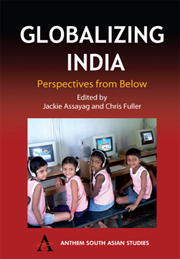Book contents
- Frontmatter
- Contents
- List of Contributors
- Acknowledgements
- 1 Introduction
- Part One Economy and Agriculture
- 2 On the History of Globalization and India: Concepts, Measures and Debates
- 3 In Search of ‘Basmatisthan’: Agro-nationalism and Globalization
- 4 Seeds of Wrath: Agriculture, Biotechnology and Globalization
- 5 Weaving for IKEA in South India: Subcontracting, Labour Markets and Gender Relations in a Global Value Chain
- Part Two Education and Language
- Part Three Culture and Religion
- Bibliography
3 - In Search of ‘Basmatisthan’: Agro-nationalism and Globalization
from Part One - Economy and Agriculture
Published online by Cambridge University Press: 05 March 2012
- Frontmatter
- Contents
- List of Contributors
- Acknowledgements
- 1 Introduction
- Part One Economy and Agriculture
- 2 On the History of Globalization and India: Concepts, Measures and Debates
- 3 In Search of ‘Basmatisthan’: Agro-nationalism and Globalization
- 4 Seeds of Wrath: Agriculture, Biotechnology and Globalization
- 5 Weaving for IKEA in South India: Subcontracting, Labour Markets and Gender Relations in a Global Value Chain
- Part Two Education and Language
- Part Three Culture and Religion
- Bibliography
Summary
Every society has to decide on the degree of reforms it may accept by opening itself to others. It is a choice that is greeted with more or less optimism and anxiety depending on cultural and historical circumstances.When the balance is tilted in favour of anxiety, what might at other times have been considered an opportunity worth seizing begins to take on the character of threat or inescapable fate. And when it comes to discussions of globalization, however sophisticated they might appear, much of what is written is simply a reflection of the deepening sense of unease felt with this sort of dilemma.
There can be few other domains in which such anxiety is so palpable as the domain of agriculture; where what is presented as defence of tradition may be easily confused with the invention of new identities, new natural species and new definitions of place. This may be partly due to the curious fact that even the greatest enthusiasts of hybridity in other domains of culture seem considerably less willing to embrace this doctrine when it comes to the issue of what they eat. But it no doubt has even more to do with the actual inability to decide, in all sincerity, what is the most desirable path for developing countries: to stick to the policy of localism, the defence of traditional agricultural practices, and self-subsistence, or to recognize the limitations of such a strategy, concurring with Amartya Sen's view that ‘food self-sufficiency is a peculiarly obtuse way of thinking about food security’ (2002).
- Type
- Chapter
- Information
- Globalizing IndiaPerspectives from Below, pp. 47 - 64Publisher: Anthem PressPrint publication year: 2005
- 4
- Cited by



